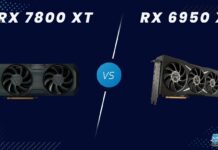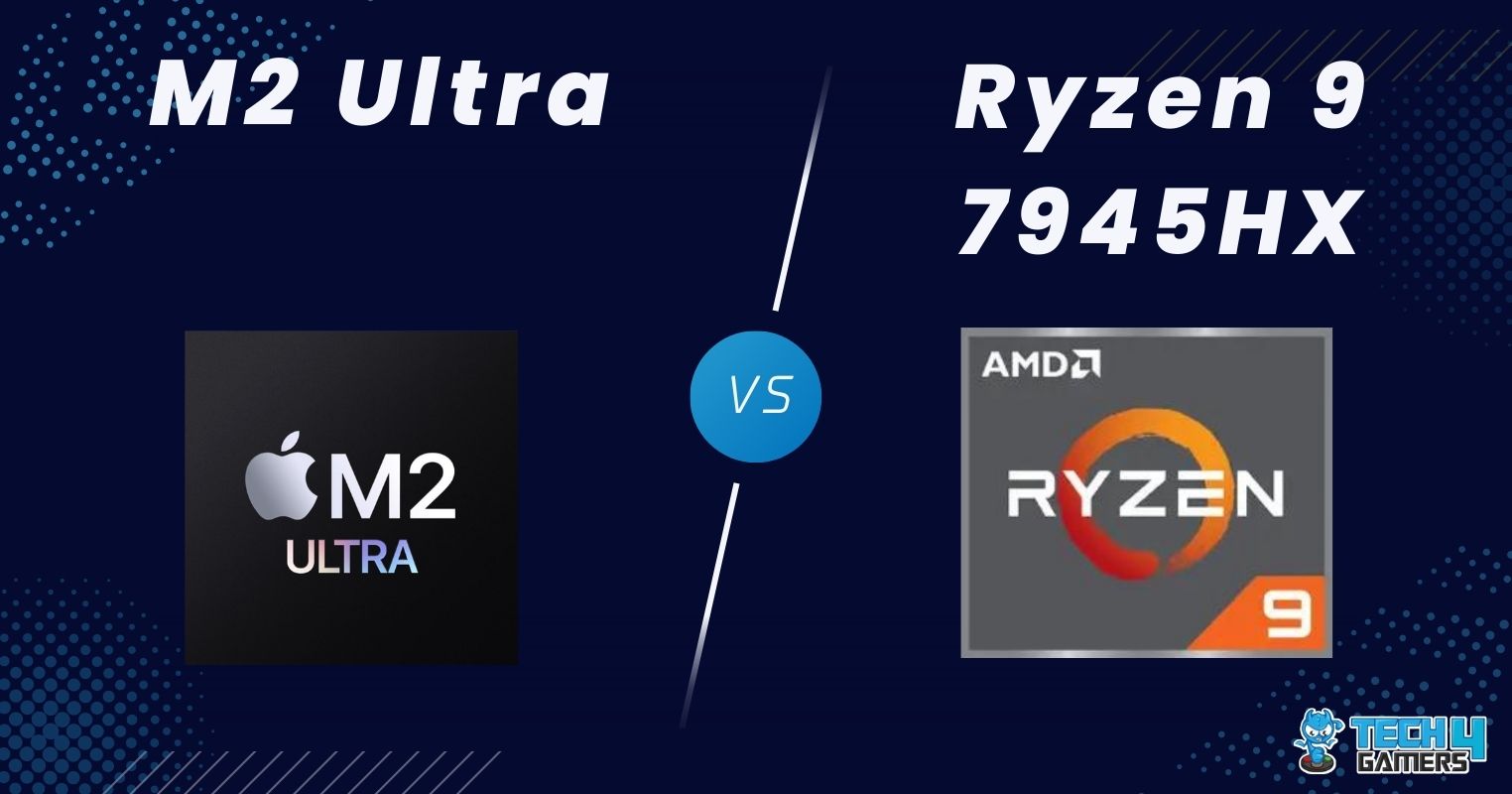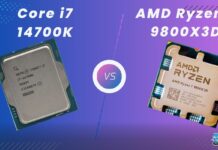Ryzen 9 9900X Rated: 8/10 Core i7-14700K Rated: 8.5/10
Pros And Cons
| CPU | Pros | Cons |
|---|---|---|
| Ryzen 9 9900X | ✅ Slightly better in terms of performance ✅ Larger L3 cache size | ❌ Higher TDP ❌ More expensive |
| Core i7 14700K | ✅ Has 8 more physical cores ✅ Much cheaper | ❌ Worse in terms of performance |
Comparison Table
Architectural Differences
- Core Count: The 14700K has 20 cores (a mix of performance and efficiency), totaling 28 threads. On the other hand, the 9900X has 12 cores, totaling 24 threads.
- Clock Speed: The base clock of the 14700K’s P-cores is around 3.4GHz, while the 9900X hangs around 4.4GHz. The boost clocks are the same between the two at 5.6GHz.
- L3 Cache: Though the 14700K has a sizeable L3 cache of 33 MB, the 9900X almost doubles this by offering a cache of 64 MB.
- Process Node: The 14700K sticks to an older 10nm process node, while the 9900X makes use of a much more recent 4nm process size.
- Memory Types: Since the Ryzen 7000 series of chips, AMD has only supported DDR5 memory, while Intel still continues to support both DDR5 and DDR4 memory.
Gaming Benchmarks – 1080p
We kept our testing of these chips short in this comparison, only looking at around 7 games. These tests were done on an identical setup for both chips, paired with the same GPU, memory, and storage. You can give the specs a read below:
Test Bench
- OS – Windows 11
- RAM – Teamgroup T-Force Xtreem 48GB DDR5-8200 CL38
- CPU Cooler – Aigo AT360 CPU Cooler
- Graphics Card – GIGABYTE RTX 4090 Gaming OC 24G
- SSD – Sabrent Rocket 4 Plus G 2TB
- Power Supply – Teamgroup T-Force Z540 2TB Gen5 NVMe SSD
Dragon Dogma 2

- The first game of our testing showed the i7’s average framerate of 102 FPS, close to 13% higher than the disappointing 90 FPS average we saw from the 9900X.
- The 1% lows were measured close to 50 FPS on the AMD chips, which had the 14700K in a 10% lead with an average framerate of around 55 FPS.
Final Fantasy XIV: Dawn Trail

- Maxing out the graphics at 1080p to stress the CPUs gave us an average framerate of 333 FPS on the 9900X, which was around 9% higher than the 306 FPS average of the 14700K.
- The 1% lows were much closer between the two chips, with the 9900X hovering around 162 FPS, only 1.2% higher than the i7’s minimum of 160 FPS.
F1 2024

- F1 ran at blazing fast framerates, with the 9900X getting an average framerate of 382 FPS, 2.4% higher than the 373 FPS that the i7-14700K supplied in our test.
- The minimum framerates flipped to favor our Intel CPU, with 1% lows of 232 FPS on the chip, around 10.5% higher than the 210 FPS that the 9900X brought to the table.
Baldurs Gate 3

- In our test of Baldur’s Gate 3, the Ryzen 9 was behind its rival by around 9.7%, with an average framerate of 103 FPS, while the 14700K had a framerate of around 113 FPS.
- The 14700K blazed ahead by around 22% in this title with its lows, with a framerate of around 63 FPS, while the 14700K hung around 77 FPS.
Cyberpunk 2077

- The 9900X took another loss in Cyberpunk 2077, where we measured an average framerate of 176 FPS, 32% behind the 14700K with an average framerate of 232 FPS.
- The 1% lows tanked by a similar 31% with 1% lows of around 142 FPS, while the Core i7-14700K had a framerate of around 186 FPS.
Call Of Duty: Modern Warfare III

- The tides swung in favor of the Ryzen in MW III; with an average framerate of around 399 FPS, it came ahead by around 17%, while the 14700K had an average framerate of around 341 FPS.
- The lows were close to 211 FPS on the 9900X, around 11% higher than the 189 FPS we saw with the Core i7-14700K.
Forza Horizon 5

- Finally, our testing reached a conclusion in Forza Horizon 5: the newer chip had an average of 297 FPS, while the i7 was around 3.7% ahead with 308 FPS on average.
- The minimum framerates also differed by only 3.5%, with the 9900X coming close to 232 FPS, while the 14700K held 1% lows of around 240 FPS.
Overall Performance
Average FPS
Surprisingly, the Core i7-14700K and the Ryzen 9 9900X were neck and neck in terms of average framerate, with the difference being only 0.28% in favor of the 9900X.
Though this figure might signify that both chips performed identically, the difference from game to game was quite drastic.
1% Lows
The minimum framerates saw a much more substantial difference between the two chips, with the 14700K being around 6.4% higher on average in our testing.
The games we tested ran at such high frame rates that the performance difference between the two chips was negligible. The CPU is no longer the bottleneck at higher resolutions, making both processors perform nearly identically to the human eye.
Power Consumption
| Game | Ryzen 9 9900X | Core i7-14700K |
|---|---|---|
| Final Fantasy XIV: Dawn Trail | 105 | 83 |
| Dragon Dogma 2 | 102 | 82 |
| F1 24 | 89 | 80 |
| Baldurs Gate 3 | 92 | 84 |
| Cyberpunk 2077 | 94 | 88 |
| Call Of Duty: Modern Warfare III | 95 | 91 |
| Forza Horizon 5 | 92 | 84 |
| Average Power Draw | 95.5⚡ | 84.5⚡ |
| Winner: Core i7 14700K | ||
Despite having a much more recent manufacturing process, the Ryzen 9 9900X consumed around 13% more power than the Core i7-14700K. This, coupled with its slightly lower average framerate, makes it significantly less power efficient, at least when it comes to gaming.
Temperatures
| Game | Ryzen 9 9900X | Core i7-14700K |
|---|---|---|
| Final Fantasy XIV: Dawn Trail | 70 | 73 |
| Dragon Dogma 2 | 66 | 79 |
| F1 24 | 62 | 73 |
| Baldurs Gate 3 | 63 | 70 |
| Cyberpunk 2077 | 64 | 74 |
| Call Of Duty: Modern Warfare III | 62 | 70 |
| Forza Horizon 5 | 61 | 72 |
| Average Temperature | 64🌡️ | 73🌡️ |
| Winner: AMD Ryzen 9 9900X | ||
The 9900X dissipated the heat it got from its extra wattage without a sweat, with an average temperature of around 13% cooler than the 14700K. Even though the 14700K was more toasty, its temperature did not raise to an alarming level.
Price And Availability
| CPU | Launch MSRP | Current Price |
|---|---|---|
| Ryzen 9 9900X | 💲499 | 💲449 |
| Core i7 14700K | 💲409 | 💲382 |
| Price Difference | 19.82% | 16.13% |
Now comes the most vital aspect of every processor: its price. The 14700K is around 16% cheaper than the 9900X, which is a hard sell considering its lower price tag. Both processors should be available at any computer store near you.
Our recommendation may vary depending on the platform you’re coming from. If power efficiency isn’t a problem and you’re on an AM5 platform, go for the 9900X. If you have an LGA1700 platform, then go for Intel. If you’re making a PC from scratch, then go with our recommendation! – Shehryar Khan
What We Recommend
Core i7-14700K: In our testing of both chips, the 14700K comes on top in all categories but temperatures. Despite being older than the 9900X, it outperforms it in every metric, which is why it’s still our go-to recommendation for high-end builds.
Ryzen 9 9900X: Even though it is more recent and has a much more advanced manufacturing process, it underperformed in our testing. The improvements with the 9900X can be meaningful, but their application in gaming is debatable at best.
Having reviewed all the aspects of the Ryzen 9 9900X vs. Core i7-14700K, we think that the latter chip is the better deal. It is more power efficient in games, has better performance, and costs less.
Yes, the Core i7-14700K and the Ryzen 9 9900X both support ECC or error correction code memory. The Ryzen 9 9900X supports 28 lanes of PCIe 5.0 connections. The Ryzen 9 9900X supports 20 lanes of PCIe 5.0 connections. FAQs
More From Core i7-14700K
Thank you! Please share your positive feedback. 🔋
How could we improve this post? Please Help us. 😔
[Comparisons Expert]
Shehryar Khan, a seasoned PC hardware expert, brings over three years of extensive experience and a deep passion for the world of technology. With a love for building PCs and a genuine enthusiasm for exploring the latest advancements in components, his expertise shines through his work and dedication towards this field. Currently, Shehryar is rocking a custom loop setup for his built.
Get In Touch: shehryar@tech4gamers.com


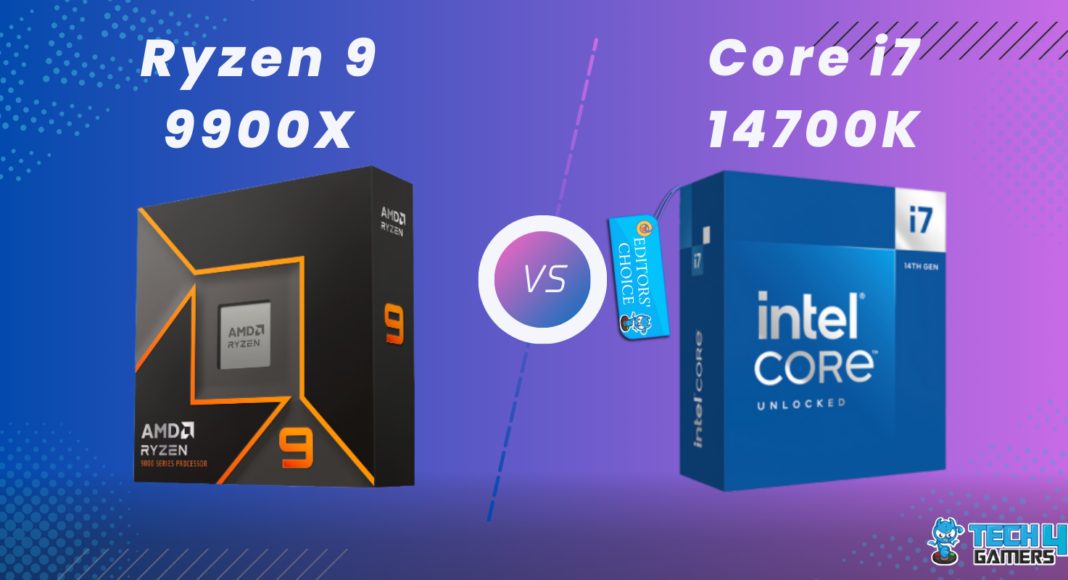
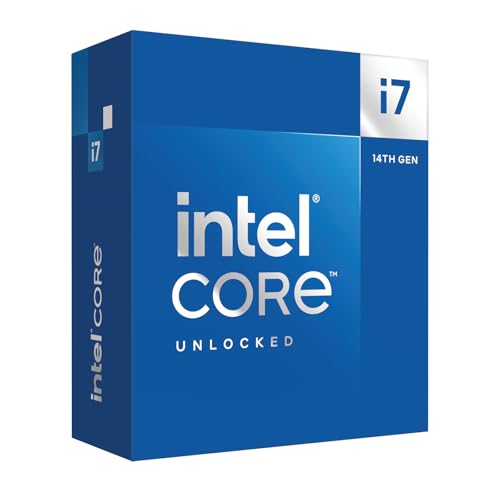

![RX 7600 Vs RX 6600 XT: [We Benchmarked Both] RX 7600 vs RX 6600 XT](https://tech4gamers.com/wp-content/uploads/2023/06/RX-7600-vs-RX-6600-XT-218x150.jpg)
